|
 . .
|
|
| .. |
Race into the Future!
A
CAD/CAM/CNC-Based Process
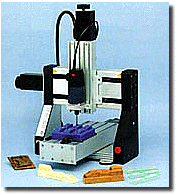
The
DaVinci XYZ System
Recent innovations in hardware
and software have opened new horizons in the way technology educators can approach the
curriculum. As our world becomes increasingly more high tech, fast paced, and competitive,
many middle and high school teachers have decided to update parts of their manual
technology programs with automated technology. One good example involves transforming the
C02 car curriculum into a CAD/CAM/CNC-based process.
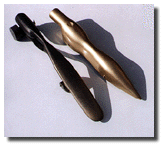
|
|
The C02 curriculum has traditionally served as an early exposure to
technology for middle and high school students. The activity begins with students
receiving a kit with a block of wood, four wheels, two axles, and a booklet that gives
design parameters and process instructions. Each student then studies design principles,
carves a car body, assembles the car, and races it in the school gym. Although this
activity has proved motivational and successful, it can be improved by updating the design
and production process with CAD/CAM/CNC (computer-aided drafting/computer-aided
manufacturing/computer numerical control). This approach teaches the skills needed in
high-tech manufacturing careers and stimulates student interest.
Benefits of CNC. Students will work hard
for something they want to own. Few at the middle school level have the carving skills
needed to produce a good product from raw stock. Some lose interest when they see that
they can’t compete with other students who have more shop experience or access to
tools at home. Frustration arises when expectations exceed abilities. Early failures can
steer students away from pursuing a technology career. Thus, the very mechanism that
teachers use to motivate students toward work in technology may backfire if it produces
disappointing early experiences. The use of CAD/CAM/CNC can "level the playing
field" and motivate students.
|
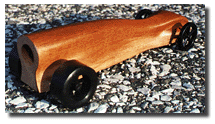
|
With
a CNC machine doing the carving, cars come out perfectly bilateral and even the wildest
designs can achieve the "concept car" look. |
| Students want these cars, and they know that winning this activity depends more
on their minds than their hands. Fortunately, technology has advanced to a point where
students can delegate laborious manual tasks to a machine. Producing high-quality projects
no longer requires superior dexterity. Also, if the C02 competition is a public
event, the sharp appearance of high-tech race cars will give a good impression to parents
and the public. More than 50 middle and high
school technology education programs in south Florida have converted to building C02
race cars with CAD/CAM/CNC, using Techno’s IMS C02 system. With the
system, students can produce C02 metric 500 cars in less than an hour. The cars
not only satisfy Technology Student Association (TSA) specifications, but they also have
placed high in state, regional, and national competitions. In the 1996 TSA national
competition, juniors with CAD/CAM/CNC cars placed first and third. A highly motivated and
enthusiastic special education student took fourth place. In the 1997 competition, four
CAD/CAM/CNC-produced cars placed in the top 10, with one taking first place.
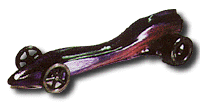
|
|
Background: The concept of
producing C02 cars with CAD/CAM/CNC has been possible for years, though not
plausible. CAD systems could describe complex 3-D shapes, but it took too long to get a
student up to speed to draw a car. CAM systems could generate the toolpath, but problems
arose in cutting out a car from the top, because the cutter got buried too deep and there
was little or no side definition. Cutting from the side addressed tool burial concerns,
but it posed indexing problems. CNC machines
could cut a car, but slow feeds and speeds made the process so time consuming that not
everyone in the class could use it. No text existed for guiding students through all of
the integrated processes.
Three companies, CNC Software (Mastercam),
Techno, and IMS Technologies have worked together to address these challenges. The
technology has come of age and pricing has fallen to under $10,000 for a complete system.
One package can process an entire class, though some instructors add additional software
stations to allow more experimentation with design.
How the process works:
|
|
Software
and template. The part is designed and toolpathed, and NC-code is generated in Mastercam
integrated CAD-CAM software. The average student can quickly design complex 3-D shapes
because of a software template system and curriculum developed by IMS Technologies. |
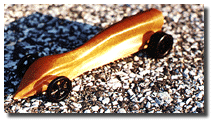
|
|
The template is a file that resides in the CAM software and coaches the student
through the design process. It gives the student a cross-sectional slice through the C02
blank, every inch showing what to avoid. The student simply draws one-half of the
cross-section shape of the C02 car by charting points with the mouse. The
software then creates a spline through those points. The student changes levels, changes
depth, hides the old template, and activates the new one. After all the cross sections are drawn, the part is
mirrored to complete the design and then rendered. The rendered image lets the student
check the design form and determine whether it meets TSA specifications. A window is put
around the cross sections and the toolpath is generated.
The generated toolpath is for the right
side of the car. This toolpath is mirrored to produce the left-side toolpath. Two
toolpaths are necessary as the car is cut from the right side then indexed to the left
side. Precision indexing is the key to cutting the car from the side.
The fixture.
A fixture is integral to the success of this process. Cutting the car from the side
eliminates cutter burial problems, and the fixture addresses indexing problems.
The C02 canister hole on the
blank is placed on a shaft on the back of the fixture, and the shaft is pushed forward.
The front of the blank fits in a holder on the front of the fixture. A few taps with a
soft-blow hammer secures the blank. The car is machined on one side, then the fixture is
loosened, indexed 180, and the other side is machined. This produces a bilaterally perfect
car.
|
|
The
CNC machine.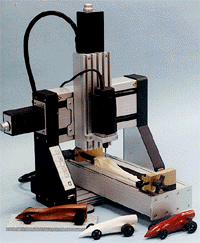 |
The
DaVinci CNC machine works well for making C02 cars. It has a work envelope and
feedrates (140 ipm) that produce C02 cars efficiently enough to run the whole
class through the curriculum. The average car takes from 8 to 10 minutes per side at 80
ipm. An average educational machine that has feedrates of 10-15 ipm would take 80 minutes
or longer. The machine has a high 24,000 rpm spindle that machines wood well. Like
industrial machines, it has ball screws on all three axes, which increases power and
accuracy. |
|
The curriculum. The IMS C02
curriculum integrates all aspects of the procedure from machine and fixture setup to
software instructions. Students and teachers receive instructional training videos and
curriculum guides, step-by-step instructions for assemble and use, clamps, fixtures, and
software. The basic system includes CAD software. CAM toolpath generation software, and a
CNC machine. The CAM software eliminates
hand carving by creating tooling instructions for the CNC machine, based on the CAD
drawing specifications. The three-axis CNC machine performs the manual labor with
precision, speed, and reliability. The only manual work left for students is finishing
touches, such as light sanding, painting the car, and adding wheels. This approach saves
students time and lets them focus on learning new skills and experimentation.
The speed of the CNC machine also allows
students to produce more than one race car, experimenting with different materials and
designs and testing aerodynamic differences. This freedom to experiment encourages
innovative thinking, creative problem solving, and collaborative brainstorming efforts.
This activity results in students learning transferable skills by using the same prototype
and design software and machines found in high-tech industrial workplaces. Students also
benefit from having the luxury of performing trial-and-error learning and discovery.
Other
options. Advanced secondary students can go beyond defining their cars
with simple cross-sectional slices. Cars can be designed using full surface modeling,
which allows for greater detail and more variation in shape.
|
|
Students might also take on the engineering challenge of designing a
car/boat/plane body. Here, they would take into consideration the particular requirements
of each type of vehicle: |
|
Car
– The most critical design factor here is weight, then aerodynamic shape, then
friction and alignment of mechanical parts, wheels, and axles. Points would be awarded for
speed. |
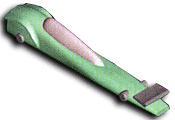
|
|
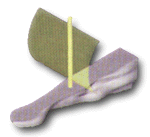
|
Boat
– The first consideration is hydrodynamic shape (water flow), then the amount of
water the shape displaces, then the placement of the mast. The boat competition would use
the same C02 body, with a spent C02 cartridge as ballast. A mast
hole would be drilled into the bottom of the car to hold a standard sail. The race would
take place in a vinyl rain gutter filled with water, and the student would provide power
with air from a portable fan. Points would be awarded for speed and straightness of
course. |
|
Plane
– The critical design factor is placement of the wings at the center gravity, then
trimming of the tail, body shape, and fuselage. The C02 cartridge would be
removed for this competition and a special plug, with tail fin support and adjustment
mechanism, would be placed in the hole. The body would be slotted to accept prefabricated
wings. The wings would slide forward and back to adjust for center of gravity. Competition
would use a mechanical launcher and points would be awarded for straightness of flight and
distance. |
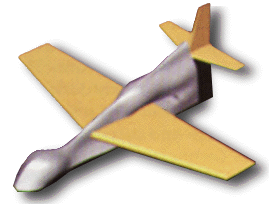
|
|
DaVinci CO2 CNC Technology
Here's the KEY to getting your students
excited about CNC!
With the Techno CO2 car curriculum, your students spend time learning technology
instead of carving and sanding. With MasterCAM Mill level 1 software, your students
learn an industrial strength program with easy to follow step-by-step instructions.
Want to know more ....... fill out the form below and we will send you more
information and a video demo about the CO2 car
curriculum.
|
|

